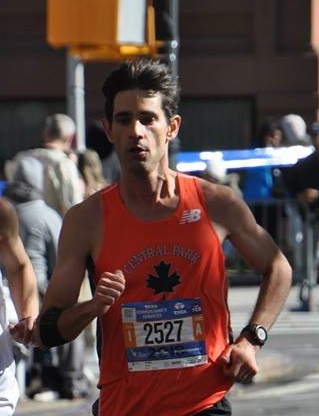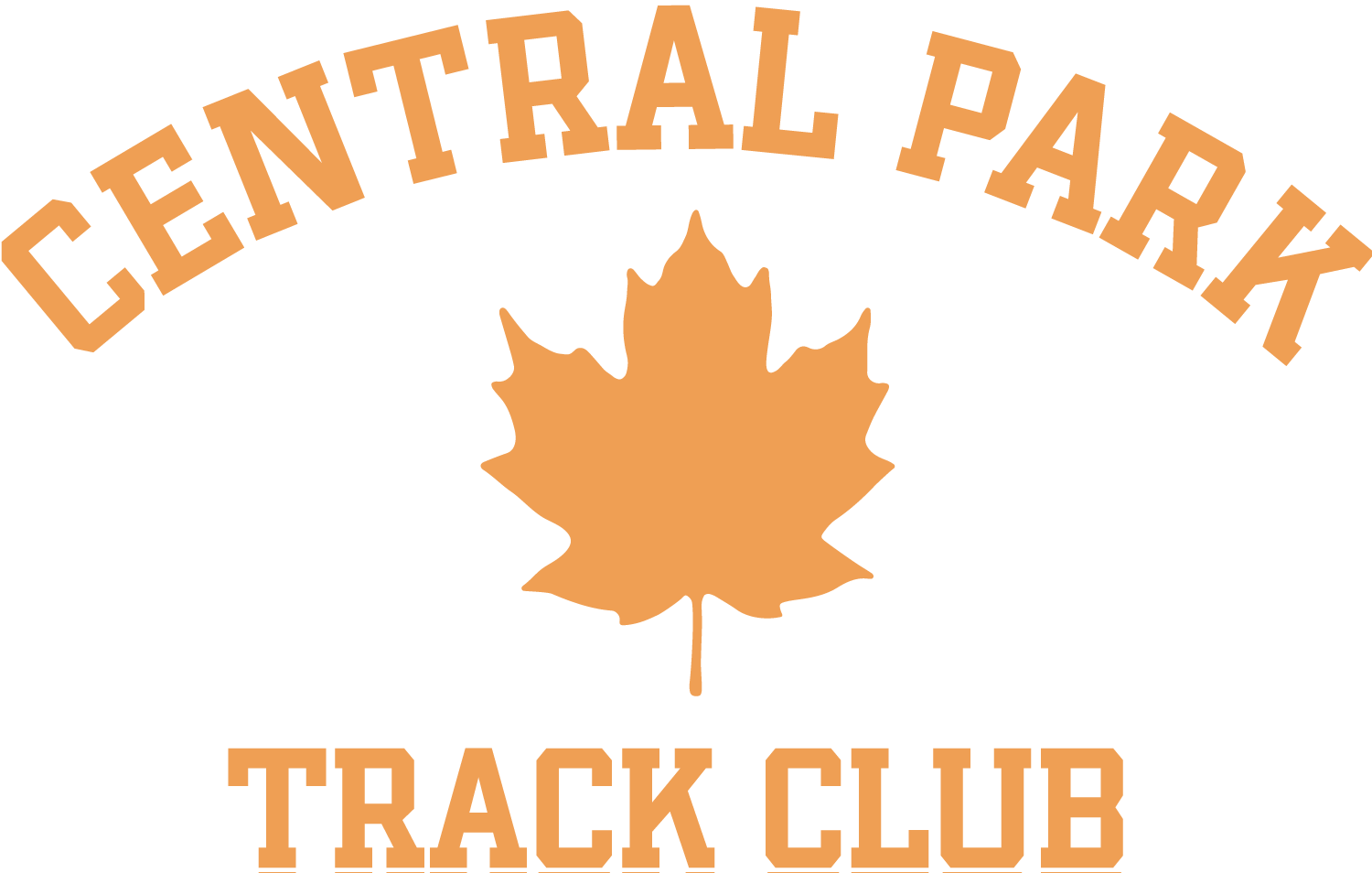The men’s 40-49 team proved on Sunday, November 4th that marathons are a test of patience and discipline. In a word, maturity. Our years of experience on the roads paid off, and we saw some times that would be just as impressive in the open field. And our depth allowed us to win the race with minutes to spare. This bumps us up to 2nd place in the standings for the year.
Our top scorer was Tom DiChiara, in 2:37:18, his first NYCM since 2011. Tom came up from his new home in Maryland to don his orange singlet again. “You always feel the love from so many teammates and other New Yorkers along the way,” he says, “as well as people who think you’re from Canada.” His favorite cheer of the day: “Go Canada! I love your potato chips!”

Nick Thompson
Just a little over a minute behind Tom came Nick Thompson, in his second 2:38 of the fall, after finishing the Chicago Marathon just a few seconds faster four weeks prior to New York. Nick approached the double bill as a kind of physiological puzzle, attempting to answer the question: “What is the level of effort in a run that actually makes someone worse?” In other words, “why can one run 20 miles at a hard effort and feel stronger three days later; but running 26.2, all out, crushes us?” He notes that each year for the past decade, after running NYC, he’s had to bag plans to run other races on account of feeling “cooked.”
This year, after structuring his training around Chicago, he wanted to see if he could still come back and run a decent race in New York, his perennial favorite. But his training in the interim wasn’t encouraging, he says. Intermittent pain in his lower abdomen and hip flexors caused him to think he might not be able to run at all, let alone come close to his Chicago time. Then, just over a week out, he did a 16-mile progression run and “felt great.” “Magically, the pain seemed to subside, my resting heart rate dropped, and I said screw it: I am indeed going to try NYC,” he says. “My kids told me, too, that it would be lame not to try.”
Nick set 2:40 as “stretch” target, and agreed to pace with teammate Isaac Markel, with whom he’d run the race last year, and “who paces like a metronome.” They went through the half in about 1:20:15, and then kept steady 6:05s to 6:10s, all the while Nick monitoring his heart rate to make sure it stayed in the same range as the first 16 miles in Chicago. Feeling good once they hit 1st Avenue, they picked it up and starting dipping into the high 5:50s. “By about mile 24, I realized I was going to go under 2:40, and then in the last mile, I realized I could get under 2:39,” he says. His last mile was was an incredible 5:41. “I was thrilled with that,” he says, “and most interestingly, I learned at least a little bit about the degree to which my normal post-marathon lethargy is physical and to what degree it’s psychological.”
Our third scorer, Eduardo Ribeiro Ferreira (2:45), says he had a strategy in place, but saw it getting away from him in the final 10K—an experience most marathoners can relate to. But, “overall, I am happy with my performance,” he says, especially considering that he was only able to get serious about training at the start of August. “I realized that in order for me to improve and have a chance to PR on this course, at this stage and age, putting in the time training for this race for at least six months, bare minimum of 18 weeks, is a must.” Eduardo adds: “A huge thanks to coach Tony, the club, and the teammates who were out there supporting us. It was great to see so many of them and thanks to their support, it helped and gave me that much-needed extra push to run and complete this very tough and challenging course.”
We also had some solid PRs: Our 4th-place finisher, Jay Sullivan, bested his previous time by a full eight minutes, finishing in 2:47:12. “Those top three are insane times for the 40+ crew,” he says. “I thought I was pretty fast.” Joe Oleary also ran a significant PR, finishing in 3:12:08, three and a half minutes ahead of his previous best.
Perhaps the best story, however, comes from Rich Nelson, who for the third year in a row guided a visually impaired runner named Matthew Turner. Last year, Turner set an 8-minute PR of 3:18 at age 52, but this year’s training wasn’t as strong. Still, Rich says they set a goal of sub-3:25 and hit their target, in 3:23:12. “Right after crossing the finish, he needed to hold onto me and our other guide as he couldn’t walk,” Rich says. “Talk about giving it everything you’ve got and finishing with an empty tank!”
Dash to the Finish 5K
We also won the Abbott Dash to the Finish 5K, the day before the marathon, with Peter Brady as our top scorer in 16:18. Peter‘s time was a tad slower than he’d like, but adjusted for the net uphill, it’s safe to say he’s in low- if not sub-16 shape. David Alm (me) was a ways behind Peter to be the second scorer for the team, in 18:04, and David Fanfan was third, in 19:48. For my part, I’ll just say that the Dash is a great event, but don’t expect a fast race. It’s crowded and you get very little reprieve from the subtle but steady climbs up 42nd Street and 6th Ave. I ran 45 seconds faster in Washington Heights last March, on what seems like a much harder course. Appearances can be deceiving!
The Soon-to-be-Renamed Daniel Ifcher Cup:
We all know the dangers of calling a contest before the final results are in, but it appears that the Daniel Ifcher Cup will soon be renamed the Osvaldo Martinez Cup, on account of that runner completing eight of this year’s points races. Excellent work and team spirit, Osvaldo! We’ve had a few people run five or six of the points races as well, but none in the sevens that I can see (if I’m mistaken, please let me know).
Nevertheless, I still hope to see many of you at Ted Corbitt. We’ve got a real shot at placing 2nd for the year, and it will all come down to how we fare at the final points race in a few short weeks.

